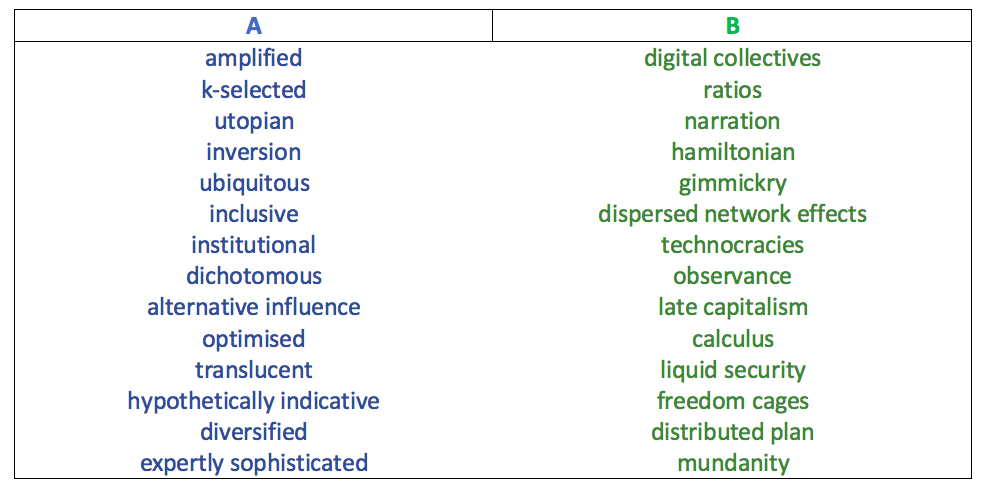|
Eric Weinstein is a very intelligent person. I'm on his side in many things (but absolutely not the top-down control he simply assumes MUST be a part of the global economy and "free" market. See here for example: https://www.edge.org/conversation/lee_smolin-stuart_a_kauffman-zoe-vonna_palmrose-mike_brown-can-science-help-solve-the#21964 (in a sense he may even have earned much fame for calling for an "economic Manhattan project". If only he meant: let's have a huge government program to get government out of the business of tinkering with economies, it'd be great. But actually? He means something more like the opposite...). Whatever the case, Eric does have lots to say and many people listen. He can't be dismissed as a postmodernist - but one could understandably make the mistake, because his use of the English language has a style that eschews clarity because of its idiosyncrasies. We all use language idiosyncratically, of course - but the desire to almost continually invent new words or usages for old ones is a strong impulse in some. Eric is simply a prominent example.
Take the talk by Eric at https://bigthink.com/videos/eric-weinstein-capitalism-is-in-trouble-socialist-principles-can-save-it (The transcript is available there). At one point he says, “Now the danger of that is that what we didn’t realize is that our technical training for occupations maneuvers the entire population into the crosshairs of software.” Translation: Everyone might lose their jobs to computers. Now aside from the fact this is flat out false (creativity, from what we know is a unique feature people have and will always be needed) it’s just expressed in such tortuous, clunky language as to muddy the meaning. Anyways that’s just one example. False philosophy shrouded in jargon. It’s not postmodernist nonsense. But it’s flirting with the style if not the substance. The whole talk, by the way, is an appeal for power and influence. He wants scientists to have more authority and bemoans the fact politicians are from “softer disciplines”. He’s upset and demands change. He says, “One of the things that I find most perplexing is that our government is still populated by people who come from sort of softer disciplines if you will. Whether that’s law, whether these people come from poli-sci, very few people in government come from a hard core technical background. There are very few senators who could solve a partial differential equation or representatives who could program a computer.” That’s clear and lacks jargon! He should stick with that style (though the substance itself this time is terrible: No thought is given to how useful those things are in creating legislation or making decisions - the task of politicians. There are probably very few Engineers or Scientists who could effectively debate, consult widely, speak clearly and publicly and simultaneously manage large groups of people. Eric himself may be one of the rare exceptions, granted. I digress: The following is meant purely as friendly fun (ok, to make a point and help out allies, perhaps). Again, Eric makes some excellent points when speaking and writing. Yet I think sometimes those points would be so much more powerful if only they were clearer. To that end, here is the beginnings of a generator for creating your own Eric-sounding neologisms. I was going to name it after him, or make fun of his name - but that seemed to cross a line. So, instead, the name of my generator commits the same sin as it perpetuates. Here's my advertisement: Do you have something insightful to say but want to cloud it in strange idiosyncratic nomenclature? Or perhaps you've no real point to make, and just feel a little "postmodern"? With the idiosyncratic neologism generator you can cloak any clear message in obtuse usage of otherwise pedestrian words. Take any term from the left hand column and pick any term on the right - it's that easy. Maybe you want to observe that sometimes people tend to waste some of their time by making silly bordering-on-mean blog posts about famous intellectuals? Need a term for that? What about...hmmm..."inversion gimmickry". And right there, you're done. Just take a pinch of column A and a random sprinkling of column B and you can spice up any vanilla concept. Turn any mundane turn of phrase into something cosmically momentous now! Testimonials "I just wanted to complain about being unable to find a date on Friday night, but didn't want to take any personal responsibility. Now I can attribute it to "ubiquitous dispersed network effects" and I feel so much better about myself!" - Terry, 19, Dubbo "I've always been a communist but because promoting those ideas is so very difficult I just complain about "amplified late capitalism" instead and people now nod judiciously! Thanks idiosyncratic neologism generator!" Jill, 52, New York "My final undergrad project counted how many times the word "man" was used in Time magazine between 1989 and 2016. But "How many times the word "man" was used in Time magazine between 1989 and 2016" as a title was rejected by my supervisor. With "Institutional hamiltonian calculus of gendered language in popular media: 1989 to 2016" I was able to get Honours First Class!" - Summer Clouds, No age, Citizen of the Universe
0 Comments
Leave a Reply. |
Archives
December 2023
CriticismThe most valuable thing you can offer to an idea Categories |

 RSS Feed
RSS Feed